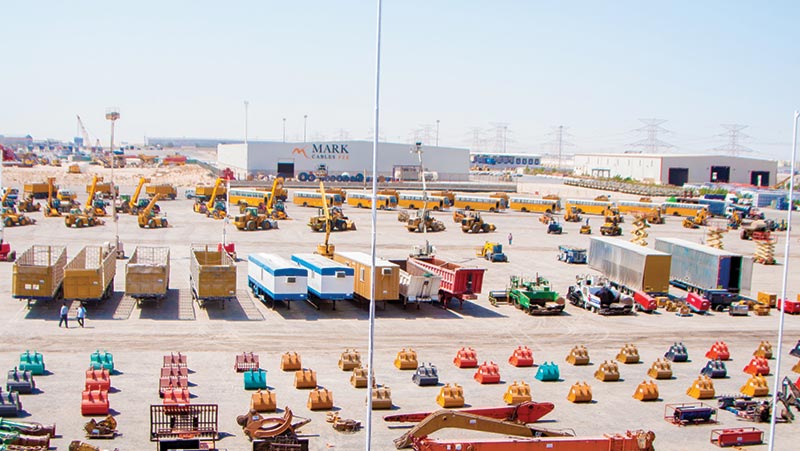Euro Auctions: The Used Equipment Market In The Middle East Is Predicted To Boom In The Next 12 Months
Mots-clés: COVID-19 , Middle East , Heavy Equipment
Tags:

The scheduled Euro Auctions plant and machinery auction on 06 July, in Dubai, is expected to attract much attention from not just the Middle East, but from a global audience. In the last 12 months, there has been a marked ‘up-take’ in the Middle East market for good machinery and equipment.
Contractors and rental companies in the Middle East have been buying relatively low levels of new machines for the last 4 to 5 years and as a result stocks of plant are aging. Not buying through dealerships, buyers have turned to auctions for good late year machines as well as new unused stock.
Now with the Covid-19 virus affecting the global economy, the used plant market could boom in the next 12 months as many OEMs ceased to manufacture. In February 2020, JCB stopped production at all its UK and China based manufacturing plants due to Covid-19. Caterpillar has been involved in China’s remarkable economic growth since the early 1970s and has also now closed its factories in China.

Derek Bleakley, General Manager of Euro Auctions, Dubai comments: “Euro Auctions has been working hard with consignors across the Middle East over the last two years to build awareness and trust, demonstrating that our auctions are the place to bring good equipment, for which in the Gulf, there is high demand. Plant and machinery auctions are no longer seen as the place to dump old, poor quality, low-spec machinery. Quite the reverse in fact, with many rental companies sending entire fleets of good, well maintained two to three-year-old machines to auction, making ideal purchases for dealers, contractors, and civil engineering companies.”
Attending big plant and machinery auctions, like the regular sales that Euro Auctions hosts every three months, offers buyers great choice with multiples of makes, ranges and models of machinery on offer at each sale. With so much choice in one place, buyers can choose machinery purchases to suit their budgets and individual requirements.
Buying at auction is a simple experience, and Derek Bleakley provides the following tips on how to bid and buy with confidence. “If you have never attended a large plant and machinery auction, it can be a little daunting with so much to choose from. Firstly, the Euro Auctions team are on-hand to provide support and excellent advice. So, do ask and we will help you. Secondly, the following tips will help you to identify the right purchase for and will help you to bid and
buy with confidence.”
Purchasing Tips By Euro Auctions
1. Research
 |
Do your research before you visit the auction. Decide what it is you are looking for, making a list of some of the specific requirements to ensure that you purchase the right piece of machinery. Avoid making impulse purchases and paying over the odds for a machine you can’t afford.
2. Location, Price & Budget
 |
Consider from where you want to buy, via a closed or public auction, where it will be possible to view multiples of the same equipment giving buyers choice. Regarding price, ask: Does it feel right? Is it too cheap? If it is, there could be a problem. Predetermine your budget, or at least be sure what the bank or finance house is prepared to advance for such a purchase.
3. Visual Checks
 |
The simplest check is visual. Is it clean, leaking fluid, does it start, is it smoking? Do all the controls work, are rams tight, are slew rings (for diggers) tight or slack, are tyres and wheels in good order? If not, how much would you have to spend to put things right if you bought it.
4. General Condition
 |
Look for overspray and painted-over decals that may indicate haste in painting or intent to cover up a problem. A cleaned or washed machine may be the mark of past good maintenance, or intent to ‘wash away’ potential problems. Look for fresh oil seeps and ‘new looking’ paint that was, until recently, protected by years of built-up grease. Look for new gasket edges and shiny metal where parts join, indicating new parts. You’ll need to know what caused a part to fail and need replacing.
5. Damage Limitation
 |
Check engine for water stains. Also check the engine block for evidence of oil leaks. Check the dipstick, for heavy dirt deposits indicating the equipment could have been sitting for a long time. Thicker oils are sometimes used to reduce leakage. Check the owner’s manual for the proper oil grade. Lastly, check the floor and under the seats for signs of rust.
6. Check VIN Plate
 |
Check the VIN plate for condition and its current position. Is its position consistent with other models in the same class? Is it fixed with new rivets that don’t match? Does it look out of place? Is it stuck on by some other means? Has a serial number been ground off and that area repainted?
7. Contractors Equipment
 |
Contractors sometimes buy less-expensive agricultural equipment for their more demanding industrial uses. Watch out for points of excess wear plus oversized or heavy-duty tires not typical of the equipment. Look for hammer marks, kinks in hoses and part misalignment, indicating that the wrong parts were used or care during assembly was ignored.
8. Check History
 |
Check the history of the machine. Is the service history available? If not, who has owned the machine previously? A couple of phone calls should turn up some intelligence. If the machine appears to be an ‘ex-hire’ item, call the hire company and ask a few questions.
9. 'Run It' and 'Drive It'
 |
Obvious, but not always done! Start the machine and observe any start-up problems, smoke puffs or unusual sounds. Load machines in all gears once warmed up to check for desired lugging power.
Vidéos
Bobcat EMEA Launches The New Generation R-Series B730 Backhoe Loader For The Middle East And Africa
Al Qahtani Vehicle & Machinery Showcasing LuiGong Machines In Saudi Arabia
Masaha Global Is Offering The Luxurious & Eagle Eye Shaped Foton Aumark Super Truck

 Équipement De Construction
Équipement De Construction
 Camions et remorques
Camions et remorques
 Matériel De Levage
Matériel De Levage
 Équipement Agricole
Équipement Agricole
 Véhicules
Véhicules
 Enchères en Direct
Enchères en Direct













